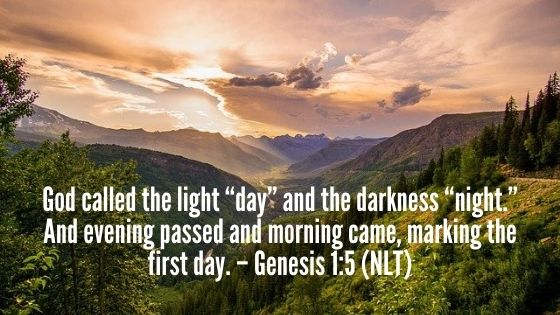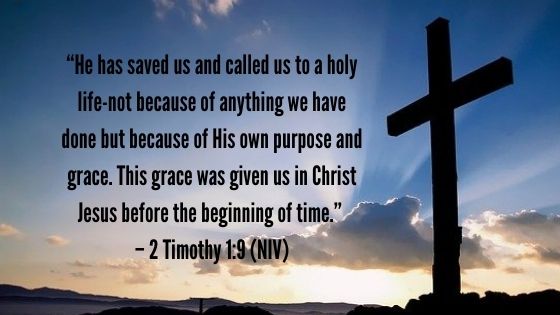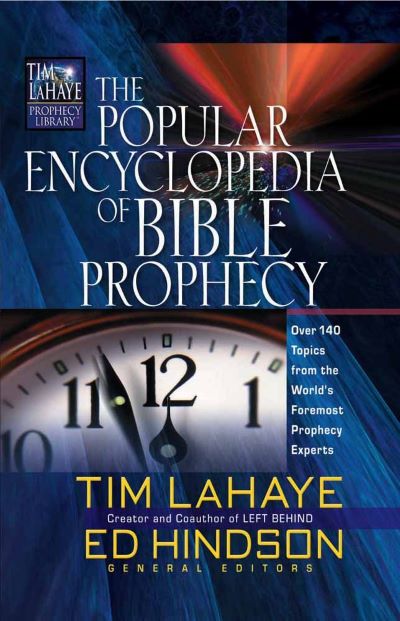When talking about the last days and end times, one eschatological term that cannot be ignored is the “Day of the Lord,” which is mentioned at least 19 times in the Old Testament and 4 times in the New Testament. What is the “Day of the Lord?”
In order to have a clear and concise understanding of the expression the “Day of the Lord,” we must first define what is meant by “day.”
The Word “Day” in the Bible
The word day is used in the Bible in three main ways and all three uses are illustrated in the first two chapters of Genesis.
First, sometimes it is used to refer to daylight; for instance, the hours between dawn and sunset (Genesis 1:5). Second, it is also used to refer to a twenty-four-hour day (Genesis 1:5). The Jewish day began at sunset and continued to the next day at sunset. Third, the word day is used in the Bible as a period of time (Genesis 2:4) just as we use it in English.

We speak of the day of our youth. Are we saying that we were young only one day? No. Rather, we are referring to the extended period of time in which we were young. The Day of the Lord falls into this final category. It is an extended period of time, not just a twelve-hour or twenty-four-hour period.
The Day of the Lord in the New Testament
In 1 Thessalonians 5:1-4, the Day of the Lord refers to an extended period of time but is given characteristics like a twenty-four-hour day. It is a day that begins at midnight or in the darkness, advancing to dawn and then to daylight.
It will close again with another period of darkness after daylight has passed. Apparently, that is the symbolism involved in the Day of the Lord.
Besides, 1 Peter 3:10-13 indicates that the Day of the Lord will include the destruction of the present heavens and earth and the creation of the new heavens and new earth.
The Day of the Lord in the Old Testament
A few sample passages in the Old Testament give a general overview of the Day of the Lord.
Isaiah 13:9-11 describes a dramatic judgment manifest in the physical world, which will interfere with the light of the sun, moon, and stars. God will put down the proud and deal with sinners in judgment.
Zephaniah 1:14-16 continues in the same strain. According to the Old Testament, the “Day of the Lord” is a time of God’s judgment and a time of God’s dealing with the world in its sin.
However, the Bible also portrays the Day of the Lord as a time of deliverance and blessing for Israel. The Day of the Lord includes the Millennium – the whole kingdom reign of Christ on earth – in which Christ personally directs the government of the world.
Zephaniah 3:14-17 pictures Israel’s blessings on that day, obviously following the time of judgment. This passage prophesies the praising and rejoicing of Israel during the Millennium on earth. Joel 3:14-18 shed additional light on the blessing phase of the Day of the Lord.
A Time of Judgment and Blessing
Putting all the above-mentioned passages, the Day of the Lord is any time God intervenes directly and dramatically in history to either judge or to bless. God has intervened in this way in the past, and He will do so again in the future.
There have been specific, past “days of the Lord” when God intervened dramatically to judge. For instance, the destruction of Egypt was called the “Day of the Lord” (Ezekiel 30:1-4). The locust plague in Joel 1 was a day of the Lord when God intervened directly to judge Israel (Joel 1:15).
Yet it is important to remember that all these past, historical days of the Lord prefigure the final, future day of the Lord.
The Future Day of the Lord
As revealed in Scripture, the future day of the Lord is a period of time that will begin with the 7-year Tribulation (the judgment phase) and will continue throughout the entire one-thousand-year reign of Christ, and the creation of the new heavens and the new earth (the blessing phase).
The future Day of the Lord will stretch from the Rapture to the creation of the new heavens and new earth. It will commence with a time of wrath and judgment upon a wicked and Christ-rejecting world and will culminate in a time of peace and prosperity; Christ will be in the midst of the earth, will rule over the earth, and will bless the nation of Israel
Much like a 24-hour day, the Day of the Lord will begin with the dark night of the Tribulation, continuing with the dawn bursting forth when Christ returns, and then the world will bask in the full sun of daylight during the Kingdom of Christ.
Living in the Day of Grace
Our present time, this current church age is often referred to as the day of grace. This is not to say that God never displayed grace in the previous dispensations. Many of God’s dealings with mankind from the Garden of Eden to the present day have manifested His grace.
People have always been saved by God’s grace through faith. The salvation of every person, no matter when he or she lived, is a work of God’s sovereign grace. But God, during this present age, has uniquely displayed His grace, highlighting it as the basis for salvation and our Christian life.
Another feature of this day of grace is that for the most part, God is not dealing openly and directly with human sin. He may impose a swift judgment in some cases, but evil people often flourish, enjoy health and wealth, and succeed in their endeavors, even though they are not Christians and do not honor the Lord.

A person today may even arrogantly blaspheme God, angrily declare to be an atheist, or openly denounce God and teach destructive ideas. Yet, God seems to do nothing about it. The Lord is not attempting to straighten that out in this day of grace.
The overriding purpose of God in this age is to proclaim His grace so that people may be saved by trusting in Christ and receiving God’s gift of grace. However, after this day of grace has run its course and the church has been “caught up” to be with Christ (an event known as the rapture), the Day of the Lord will begin when God will punish human sin directly in wrath and judgment.
Conclusion
Scripture clearly portrays the Day of the Lord as a day of divine judgment upon the world followed by a time of unparalleled blessing.
In the Day of the Lord, Christ will rule with a rod of iron over the entire earth (Psalm 2:9; Revelation 2:27). He will administer absolute justice (Isaiah 11:1-9). On that day Israel will also be regathered (Isaiah 11:10-12) and brought into the perfect peace of the millennial kingdom (Zephaniah 3:14-20) and on to the creation of the new heaven and new earth.
Disclaimer: As an Amazon Associate, I may earn a commission when you use any links on this page to make a purchase, but at no additional cost to you.
Recommended Resource: The Popular Encyclopedia of Bible Prophecy: Over 150 Topics from the World’s Foremost Prophecy Experts
Edited by Tim LaHaye and Ed Hindson
 More than one-fourth of the Bible was prophetic in nature at the time it was written, and Christ’s second coming is mentioned more than 300 times in Scripture. Clearly, God wants you to anticipate the last days—but Bible prophecy can seem vague and mysterious.
More than one-fourth of the Bible was prophetic in nature at the time it was written, and Christ’s second coming is mentioned more than 300 times in Scripture. Clearly, God wants you to anticipate the last days—but Bible prophecy can seem vague and mysterious.
Find the clarity and answers you need in this comprehensive resource filled with thousands of facts about Christ’s return and the end times. Prophecy teachers Tim LaHaye and Ed Hindson combine knowledge from an outstanding team of more than 40 experts to bring you…
- detailed definitions of prophecy-related terms
- helpful timetables of last-days’ events, including the rapture and the glorious appearing
- thorough summaries of all the major prophetic viewpoints
- vital understanding of the key players, such as the Antichrist and the False Prophet
Gain wisdom and insight as you repeatedly reach for this A-to-Z encyclopedia to find biblical answers to your toughest prophecy questions.



As shown below, John in Revelation uses the words of Joel and Isaiah when describing the sixth seal.
Joel speaks of events before the Day of the Lord and Isaiah speaks of events during the Day of the Lord. If you have events before the day of the Lord and events during the Day of the Lord both mentioned in the 6th seal, then the Day of the Lord must start in the 6th seal.
The testimonies of John, Joel & Isaiah clearly place the start of the Day of the Lord in the sixth seal. This does not disprove the pretribulation rapture view, but it places the rapture about 7 years before the Day of the lord.
Rev 6:12 I looked when He opened the sixth seal, and behold, there was a great earthquake; and the sun became black as sackcloth of hair, and the moon became like blood. (Joel)
Rev 6:13 And the stars of heaven fell to the earth, as a fig tree drops its late figs when it is shaken by a mighty wind.
Rev 6:14 Then the sky receded as a scroll when it is rolled up, and every mountain and island was moved out of its place.
Rev 6:15 And the kings of the earth, the great men, the rich men, the commanders, the mighty men, every slave, and every free man, hid themselves in the caves and in the rocks of the mountains,
Rev 6:16 and said to the mountains and rocks, “Fall on us and hide us from the face of Him who sits on the throne and from the wrath of the Lamb! (Isaiah)
Rev 6:17“For the great day of His wrath has come, and who is able to stand?”
Joe 2:31
The sun shall be turned into darkness, and the moon into blood, before the coming of the great and awesome day of the LORD.
Isa 2:19
They shall go into the holes of the rocks, and into the caves of the earth, from the terror of the LORD and the glory of His majesty, when He arises to shake the earth mightily.
Isa 2:20
In that day a man will cast away his idols of silver and his idols of gold, which they made, each for himself to worship, to the moles and bats.
Isa 2:21
To go into the clefts of the rocks, and into the crags of the rugged rocks, from the terror of the LORD and the glory of His majesty, when He arises to shake the earth mightily.
Thank you, Daniel, for your comment. I appreciate your input.
Have a great and blessed day!
The Pre-trib doctrine is a human construct not Biblical truth. Just call it for what it is.
It started with Darby in the 1830s and Scofield Bible wrote it as if it was Biblical doctrine. It is NOT. It’s in direct violation of Jesus’ instruction in Acts 1:7-8. Sadly, modern writers have got rich with their books.
A good chance is that they have already received their rewards in full. These include Hal and Tim LaHaye.
Hi George,
Thanks for your comment.
However, to say that the pre-trib rapture is not Biblical because it started with Darby can no longer be supported by careful historians in light of overwhelming research to the contrary.
Historian William Warson said this, “Despite the claims that Christian Zionism and premillennial Dispensationalism are of recent origin, very little of what John Nelson Darby wrote in the mid-nineteenth century was new.”
Norman Geisler notes, “The primary question is not whether the doctrine was taught by the early church, but when it was taught by the earliest church — the church of the apostles.”
And so, while the pre-trib view was not the dominant view of eschatology throughout most of church history, it existed long before Darby.
If you want to read more about the Rapture and the Second Coming, you can follow the links below.
https://biblical-christianity.com/a-bible-study-on-the-rapture
https://biblical-christianity.com/the-rapture-mystery-revealed
https://biblical-christianity.com/rapture-versus-second-coming
https://biblical-christianity.com/why-i-believe-in-a-pre-trib-rapture
Please read the articles and leave your thoughts.
God bless!